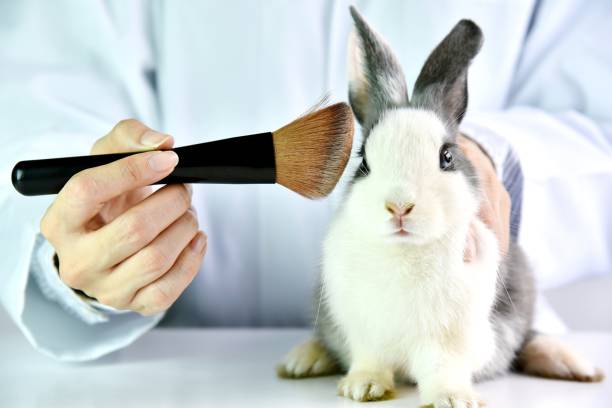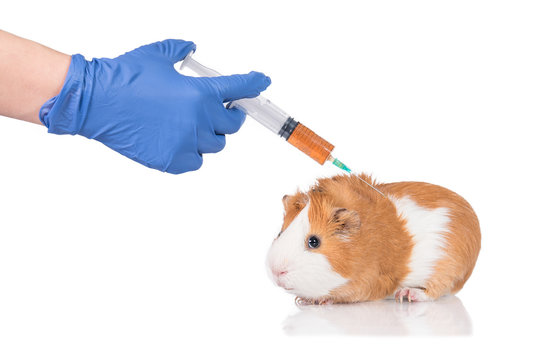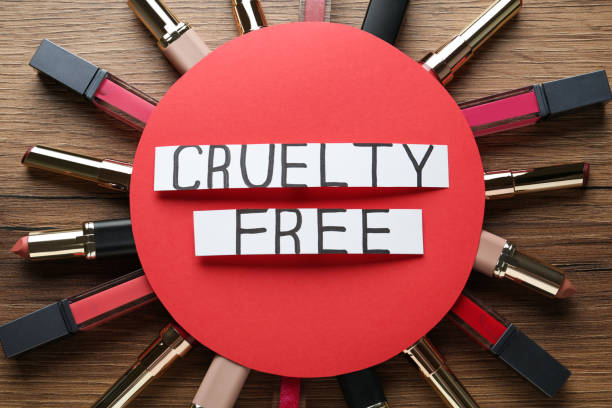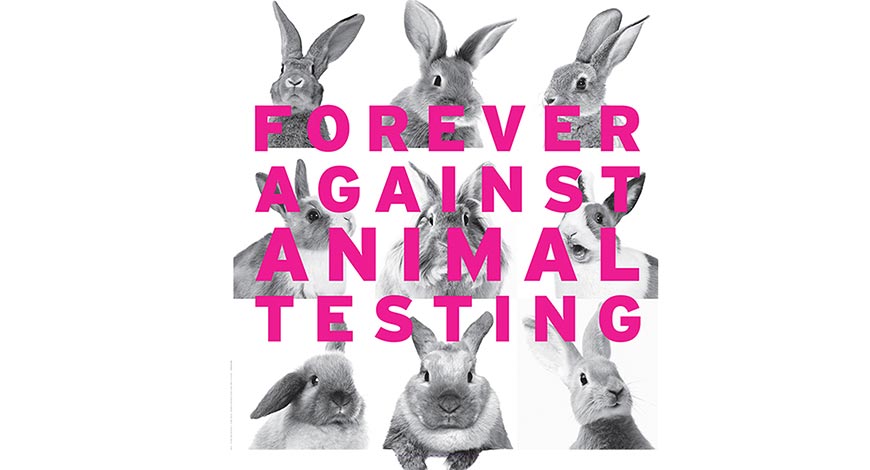During the past few months, rather disturbing information has been hitting the front pages of social media and news bulletins worldwide. The gruesome testing of various cosmetic products on animals, along with the rates of animal cruelty, have been increasing exponentially – mainly due to the unchecked practices of this industry. Though an animal testing ban has been currently introduced in most EU countries, the EU Parliament continues to strive for its goal to initiate a global blanket ban against this brutality, whilst pushing for cruelty-free cosmetic lines in the near future.
What goes on behind the ‘cosmetic curtain’?
When it comes to purchasing your favorite highlighter, contour stick, or blush, how much do you really know about the process that goes into manufacturing and testing those products? For roughly a century now, it has been quite a common practice for manufacturers in the cosmetic industry to test their products on live animals – subjecting them to the brutal aftereffects of this activity, which often leaves them not only physically crippled but mentally scarred as well. All this is done to determine the product´s safety for human use. One would think that this blatantly obvious form of animal abuse and cruelty would at least be prohibited within the cosmetic industry in the 21st century, but some manufacturers still turn a blind eye to their testing methods, all the while, the safety of innocent animals is being disregarded for the advancement of the industry.

Though it is true that most companies have taken a step forward in supporting the eradication of the use of animals in cosmetic testing, some cosmetic manufacturers around the world still continue to lab test their products on animals. It is important to mention that the purpose of this article is not to call out specific brands of makeup, but to provide information on what is needed and what the public can do to support the ban on animal testing. For the majority of the companies that are still using this method of testing, there is a loophole in place. That being that most of these brands are resold in China, where the law states that animal testing is mandatory.
For example, NARS, which was once a cruelty-free brand, changed its policy this year to match that of China’s due to selling its products in that country – therefore, it no longer stands as cruelty-free. Unfortunately, a widely known and popular makeup brand, MAC, follows in the same footsteps as NARS. Though their products are sold worldwide, they are also sold in China, where MAC goes along with the same loophole as before – which is a shame as this company was also previously a cruelty-free brand. One other global cosmetic brand that belongs in this category is L’Oreal. There are instances where some companies may address their wrongful testing methods to the public, but carry on with them privately. In the case of L’Oreal, the company claimed to not test their products on animals, whilst funding animal testing in countries like China. Their products are also sold in China, and therefore their rationalization is that their finished products might be tested on animals according to the law in that country. Furthermore, they are included in PETA’s “do-test’ list, which indicates that they in fact do test their product on animals. There have been many claims and complaints against L’Oreal’s approach to handling and misleading the public on this matter, which is still an ongoing issue today. These are only some of the cosmetic brands that are presently conducting animal testing for their products gain.
No more harm! Globalize the Animal Testing Ban!

According to Cruelty-Free International, animal testing seems to be pretty pointless. When you come to think of it, though animals may be the closest thing there is to humans in an evolutionary sense, animals don’t develop the same diseases and allergies that humans do – thus, the science seems ineffective. The scenarios that scientists create for testing on animals may be hypothetical, but the after-effects for these creatures are very real. The animals that are mostly used for testing are guinea pigs, mice, rats, rabbits, and at times dogs as well. They suffer through various testing scenarios – some of which include evaluations for skin and eye irritations, and any type of toxicity, which would, in turn, cause the animals to suffer an immense amount of pain, and at times death. Moreover, at the end of multiple rounds of testing, the animals are put down without any sort of pain relief prior to the procedure. This is an unfortunate event, even more so due to the fact that these animals are not protected under the Animal Welfare Act, which was initially enacted by the US. Once again, The Humane Society explains that due to different animals reacting in contrasting ways to these products, most companies disregard the results from such tests, eventually rendering this type of testing senseless, which would mean the subjects went through all that harm for nothing.
Observing the procedures and detrimental aftereffects that these animals have to go through, in 2018, the European (EU) Parliament urged for a global ban on animal testing within the cosmetic industry by the year 2023. Since the issuing of this recommended ban, many countries such as Japan, the USA, Canada, Russia, and South Africa, have begun phasing out animal testing. The urgency for this ban to go global is one that should not be underestimated. As of recently, a resolution vote was called on the European Commission and adopted by the members of the EU Parliament to set up an EU-wide action plan to actively phase out animal testing – which would mean calling for a global blanket ban on animal testing thereafter. In 2020, EU’s animal protection groups – PETA, Cruelty-Free International, and 450 other companies – inclusively urged the EU officials to uphold the cosmetic testing ban. Within the open letter that was addressed to the commission and other authorities, they called for new testing to be stopped and for the European Chemical Agency (ECHA) to accept testing methods that don’t include animals. Moreover, during the past year, alignment between ingredient suppliers, beauty majors, NGOs, and trade associations had occurred on the animal testing issue, with the support of the aforementioned open letter issued to the EU Commission. With the death rate of innocent animals rising each year, the need to globalize the Animal Testing Ban, though not a small feat, must not be ignored any longer. In spite of the slow but steady progress that has been made in this sector, there is still much more to do in terms of encouraging many other countries to support the ban altogether.
On the bright side…

Whenever you purchase cosmetics, do you ever wonder if your makeup is socially responsible? What I mean by this is, does the brand of makeup you buy, test their products on animals or not? Cruelty-free makeup is beginning to take its place in the spotlight of ethically responsible product manufacturing, and with this, more cosmetic companies are slowly but surely transforming their products to vegan and cruelty-free. For example, Glossier, which is a well-established makeup brand, has held its cruelty-free stance since its launch in 2017. Not only are they firmly committed to maintaining their standards of cruelty-free products, but they also subject their products to regular checks that ensure they are following the international cruelty-free certification standards. Another example of a cruelty-free brand is bareMinerals. While their makeup is not tested on animals, they also refrain from adding any chemicals, preservatives, oils, or fragrances to their products – hence the name bareMinerals. Additionally, they strive to focus on manufacturing clean, vegan, and non-animal tested beauty products with every campaign they put forward. One other example would be International Pop-star Rihanna’s makeup line, Fenty Beauty. There was no doubt that, even at its launch, this makeup brand would take the world by storm. Even though its global progression, the brand, and its founder, never fail to publicly address the fact that the makeup line is purely cruelty-free and ethically responsible.
So, what do we do now to end animal-testing?
Overall, while some countries and makeup brands have advanced in their approaches to stop animal testing in the cosmetics industry, other nations have a bit more work to do in that area. In the meantime, as a society, we can encourage one another to become more socially and ethically responsible, by investing in cruelty-free and clean makeup brands and supporting animal rights protection organizations, such as Cruelty-Free International, in their endeavors to end such harmful activities. With the open letter put forward by animal rights protection organizations, as well as the urgent call for the animal testing ban to go global by the EU, we can mount pressure so that the harming of these innocent creatures will end sooner than later.
IVolunteer International is a 501(c)3 tech-nonprofit registered in the United States with operations worldwide. Using a location-based mobile application, we mobilize volunteers to take action in their local communities. Our vision is creating 7-billion volunteers. We are an internationally recognized nonprofit organization and is also a Civil Society Associated with the United Nations Department of Global Communications. Visit our profiles on Guidestar, Greatnonprofits, and FastForward.


